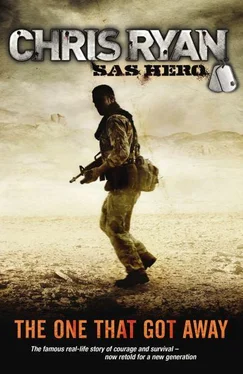When we landed at Al Jouf, the first thing we noticed was the wind. It was much colder there. But because we’d been told we were going to deploy into Iraq immediately, we’d left most of our warm kit behind.
We began to unload our equipment and pile it in a grassed area that was like a garden, about thirty metres by twenty, next to one of the hangars. Someone told us we’d be sleeping that night in the grassy area; so we sorted out bivvy bags and sleeping bags, made a brew, and got our heads down in the open.
The night sky was clear, and as we lay there we watched streams of B-52s crossing high above us, with fighters skimming like minnows alongside. The sight sent my mind straight back to the time when, as a boy, I’d watched television pictures of B-52s going over in streams to bomb Vietnam. Now, as the aircraft reached the Iraqi border, their flashing lights were suddenly extinguished, but we heard the roar of massed jet engines rumble away into the distance. It was comforting to know that our aircraft were bombing the enemy. We hoped they would do enough damage to make Saddam capitulate before we were even deployed.
Morning showed that the airfield at Al Jouf was surrounded by security wire and primitive, flat-roofed wooden towers with glass windows, which reminded us of the German concentration camps we’d seen in Second World War films. There was one main terminal, quite small, with a few other buildings attached to it. Our regimental headquarters and all our stores were there, but we were billeted on the other side of the airfield. Here there was a cement building with a single washbasin and a hole in the ground to act as a toilet. It soon became blocked.
The SSM had been told to bring the squadron tents, but he had decided that, because we were in the desert and the weather would be hot, we wouldn’t need them. Our first impressions had been correct, however: it wasn’t hot at all; it was very cold, and the dust was everywhere. All we could do was sling cam nets from our vehicles for a bit of shelter, and we lived on the ground like pigs, huddled around the Land Rovers. We had no tables or chairs, so we ate our meals sitting on the deck, with the dust blowing around everywhere, covering us, our kit and our food.
We had no time for detailed planning but our task seemed fairly simple. Looking at our maps we could see that the site we’d chosen for our laying-up position was opposite a slight bend in the main supply route. It looked from the map as though we could dig into the bank of a wadi — a dried-up river bed — and have a view straight up the gully to the big road.
If we saw a Scud on the move, we were to report it immediately over the Satcom telephone, and follow up with a message on the 319 radio. Then aircraft would be launched or vectored to take the missile out. A brief on the missiles gave us an idea of what big beasts they were. Just over thirteen metres long and one metre in diameter, they would look a bit like fuel tankers when in the horizontal position on their trailers — the TELs. Apparently the Iraqis’ habit was to park them alongside embankments or under road bridges so that they were all but invisible from the air. When on the move, a TEL would always be accompanied by other vehicles in a wide convoy.
Privately, we agreed that if we did find a convoy we would allow a few minutes to pass before we reported it — otherwise the Iraqis might work out where we were. And we were worried about what the Scud warheads might contain: if they were nuclear, or full of gas or biological agents, we didn’t want to be around when they came apart. We were also nervous of using satellite communications, because a good direction-finding station can locate a transmitter within twenty seconds. We practised getting on the phone and reporting a Scud sighting in as few seconds as possible.
Bravo One Zero and Bravo Three Zero had decided to take vehicles in with them, but at the last minute we opted to go without. Over the past few days we had talked about it a lot. Obviously vehicles would enable us to drive out of trouble and back over the border if things went wrong, but nobody in the patrol thought that vehicles were essential. Looking back, though, I realize that I had a strong influence on the decision. I had made more OPs than all the rest of the guys in the patrol put together, and I considered myself something of an expert at the job. But I had never operated in the desert, and just couldn’t see a small patrol like ours escaping detection if we were saddled with vehicles.
I realize now it was a big mistake to go without them. We should have driven in, installed an OP with a couple of men, then pulled off to a safe distance and hidden the vehicles under cam nets in the bottom of some deep wadi. That way, we would have been more mobile and could have loaded the vehicles up with powerful armaments, including heavy machine guns.
No vehicles also meant we had to carry huge individual loads. The average weight of a bergen was 60 kg. With that lot on, you had to walk with your head down like a donkey, so that you’d be useless in a contact, and if you fell over you’d be knackered. But that wasn’t all. Apart from the bergens, each of us had a belt-kit of pouches weighing 20 kg, and a whole load more gear that wouldn’t fit in anywhere else: seven days’ rations in one sandbag, two NBC suits in another, an extra bandolier of ammunition, extra grenades for the 203 launchers, and a jerry can of water. Altogether we had nearly 120 kg of kit each. To put that into context, that meant I was carrying about my full body weight plus half as much again!
Talking to the RAF helicopter pilots who were going to fly us in, we heard how they planned their routes into Iraq to avoid known anti-aircraft positions. With their help we identified the precise spot at which we wanted to be dropped. At first we chose a point five kilometres short of our lying-up position, but later, because of the weight of our kit, we changed our minds and asked to be put down only two or three kilometres short.
Arrangements for evacuation seemed straightforward enough. If we had not come on the air within forty-eight hours of being dropped off, a chopper would come back to pick us up. If we needed casevac (casualty evacuation), a heli would come within twenty-four hours of any call. If we had a contact and needed assistance, half the squadron would be on board the helicopter to pull us out.
The OC tried to reassure us. ‘Don’t worry,’ he said. ‘You’ve got your three-one-nine radio. You’ve got your Satcom. You’ve got your tactical rescue beacons. ‘A’ and ‘D’ Squadrons are going to be in your area. Also, you’ve got the forty-eight-hour Lost Comms procedure, and the twenty-four-hour casevac.’ That all sounded fine — but things didn’t turn out quite as we hoped.
One detail to which we should have paid more attention was our cover story. We agreed that if we were captured, we would pretend to be members of a medical team, sent in to recover downed aircrew, or possibly members of a team sent to provide security for medics, and that our chopper had been forced down. The general idea was to stick as close to the truth as possible, but to say that we were reservists or ordinary infantrymen, and that we’d been brought into the war because we worked in a medical centre. Yet we never had time to work things out in any depth — to decide, for instance, which fictitious regiment we belonged to.
We went off in such a rush that when we boarded the Chinook on the evening of 19 January, Andy was still being briefed on the ramp at the back of the helicopter. (Bravo One Zero and Three Zero were to go in the next night.)
Guys from ‘B’ Squadron threw our kit into vehicles and came with us to the helicopter. I sensed a peculiar atmosphere. Nobody had much to say. As we were going on board, our mates were all around us, but I got the feeling that they thought this was a one-way ticket. Somebody said to me, ‘This is ridiculous — it’s not on, to carry loads like this.’
Читать дальше












